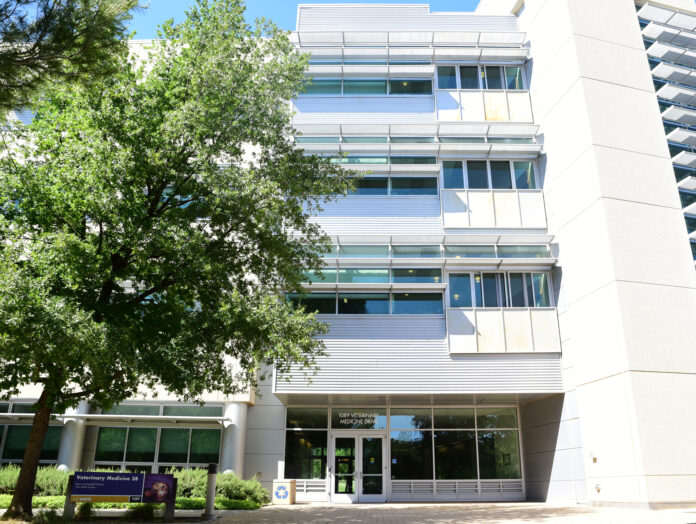Students majoring in the animal sciences share what sets Davis’ program apart from other universities
By ZOEY MORTAZAVI — features@theaggie.org
If there is one thing UC Davis is known for, it is the university’s deep-rooted connection to animals and farming. When many think of Davis, its association with cows and agricultural life may be some of the first things that come to mind.
This may be because UC Davis’ Veterinary School is the No. 1 veterinary program in the United States, according to U.S. News and World Report. Davis is also ranked as the second-best program worldwide, with the first-place ranking going to the Royal Veterinary College at the University of London.
Davis’ veterinary residency program is the nation’s largest by far, offering more than 30 specialties and hosting more than 700 students in pursuit of the Doctor of Veterinary Medicine degree, as well as other professional and graduate degrees. UC Davis undergraduate students majoring in animal sciences have reported loving the hands-on approach and interactive labs that many courses here include.
Sadie Liu, a first-year animal science major, shared some of her experiences as a student in the Department of Animal Science.
“As an aspiring pre-veterinary student, I have absolutely loved every second of my experiences here at Davis,” Liu said. “The animal science classes and labs that I’ve taken have been incredibly hands-on and eye-opening, and I adore spending time with all the newborn animals, too.”
Liu is also the current secretary for Davis’ Veterinary Aide Club. She explained that Davis takes an interactive approach to its animal science program that helps it stand out among many other prestigious universities.
“I think that these interactive opportunities are truly what sets the Davis veterinary program apart from other colleges, as they not only instill scientific and technical knowledge, but also ethical and moral consideration,” Liu said. “I am so excited to continue my veterinary pursuits at Davis, and I can’t wait to see what the program teaches me next.”
In addition to boasting a successful program, the veterinary school’s hospital aids over 50,000 patients each year and utilizes over $89 million in annual research funding. The school also celebrated its 75th anniversary in April of 2023.
The hospital has also received approval from the American Animal Hospital Association, which is the only current organization to accredit companion animal vet hospitals like the Davis veterinary school. The hospital hosts the Veterinary Center for Clinical Trials, which provides undergraduate students with the chance to work with animals, veterinary professionals and other researchers in the field.
Undergraduate students have expressed that the empirical lab approach at Davis is what makes the program so useful for students trying to become veterinarians.
“I think anyone who is hoping to pursue a career in the veterinary field has heard about UC Davis’ prestige in both animal and veterinary science,” Olivia Patsch, a first-year animal science major, said. “The action-based labs really go to show why Davis has a top spot in this field. I feel like UC Davis is all about learning by doing; I’ve been exposed to so many different types of animals and different ways of applying concepts that I’ve seen in class.”
Patsch continued to discuss some of the benefits that she has observed as a part of the program as an undergraduate student.
“There are so many research opportunities and the professors I’ve had thus far are so caring,” she said. “There’s a pretty massive stockpile of information and resources for students to chip away at, and I’m really looking forward to my next three years here as an animal science major.”
All of the animal science programs at Davis are a subset of the university’s College of Agricultural and Environmental Sciences. The college offers 27 majors, including the animal science and animal science and management major.
As students progress further into the animal science curriculum, many choose to apply to veterinary schools when they become upperclassmen. Students who receive their undergraduate degrees from Davis have access to the veterinary school’s resources before applying, which many consider a plus of the undergraduate animal science program.
Chloe Palarca-Wong, a fourth-year animal science major, shared her thoughts on the department as a student who is graduating this year.
“The animal science classes have been really interesting and hands-on, which is something I don’t think you can get at a lot of other schools,” Palarca-Wong said. “The highlight for me is definitely being in Davis, where there are so many opportunities to engage in veterinary medicine — there are clinics, volunteering and a lot of research options.”
Palarca-Wong continued by explaining what makes Davis’ labs and programs unique.
“In labs, we work with the dairy cows, sheep, pigs, goats, chickens and other animals too,” Palarca-Wong said. “It’s really cool because we’ll learn things on paper and we get to actually see and apply those concepts to the animals in-person. Another great thing is that all the professors who teach the courses and labs have their own research, and they take undergraduate students and will let you work with them, because Davis is a big research institution.”
Universities all over the world have specialities and programs that stand out; here at Davis, the veterinary school and animal science program are the primary example of that. Davis’ program has contributed a great deal to veterinary medicine and will continue to do so for years to come as the program continues to develop, expand and flourish.
Written by: Zoey Mortazavi — features@theaggie.org




